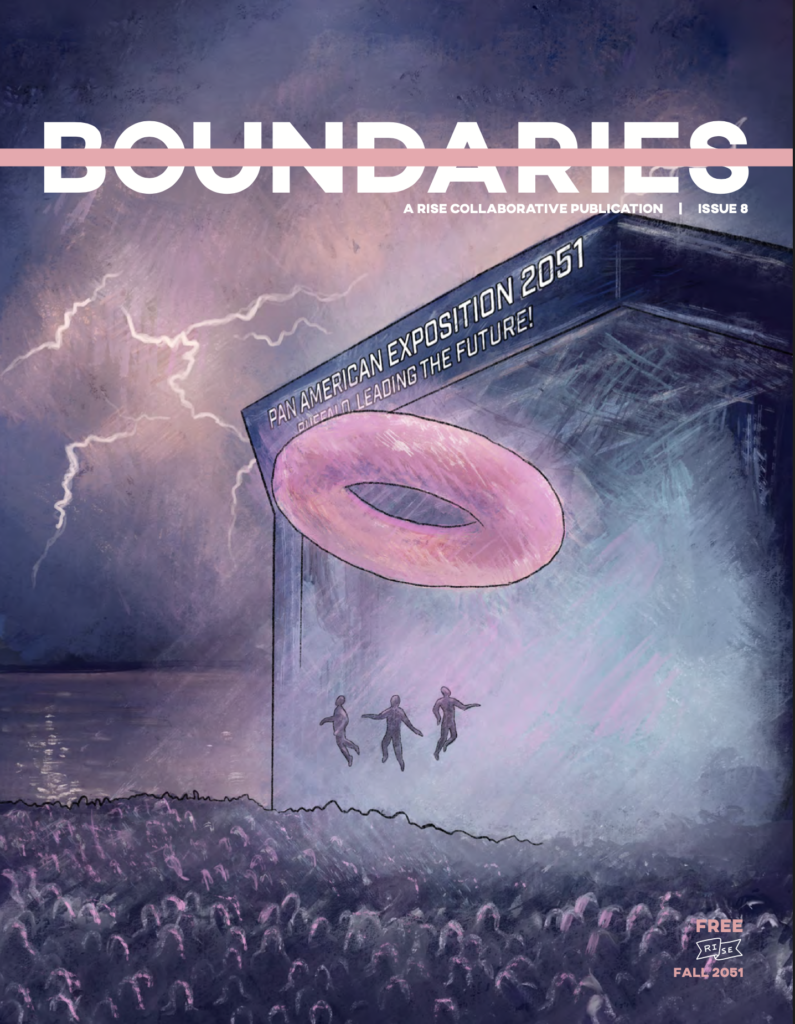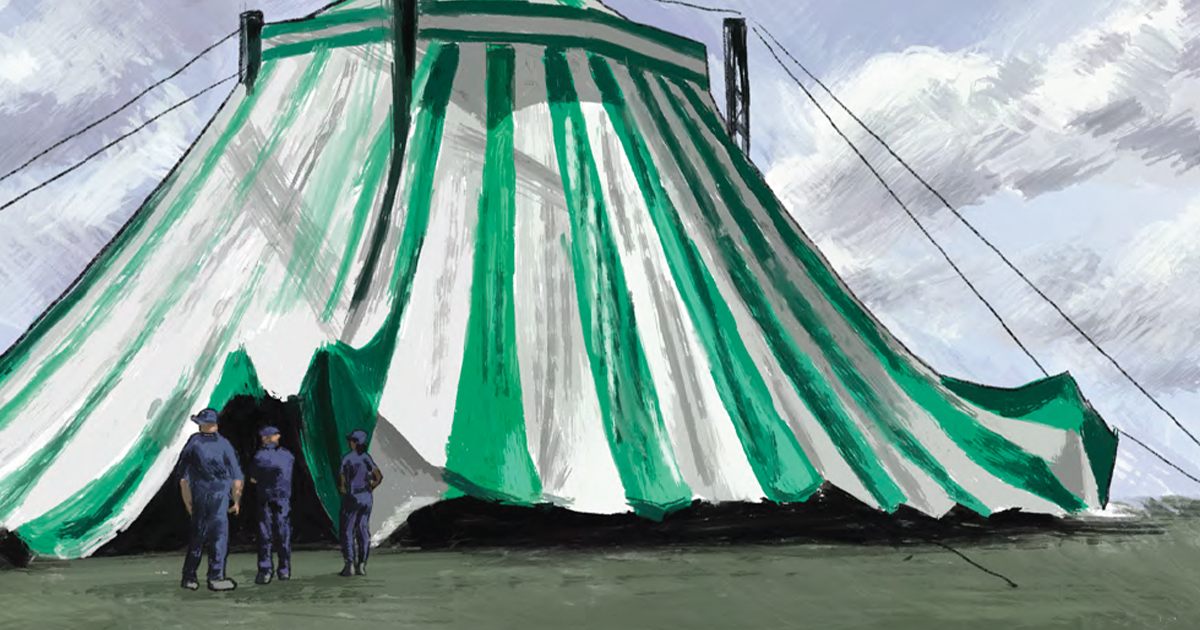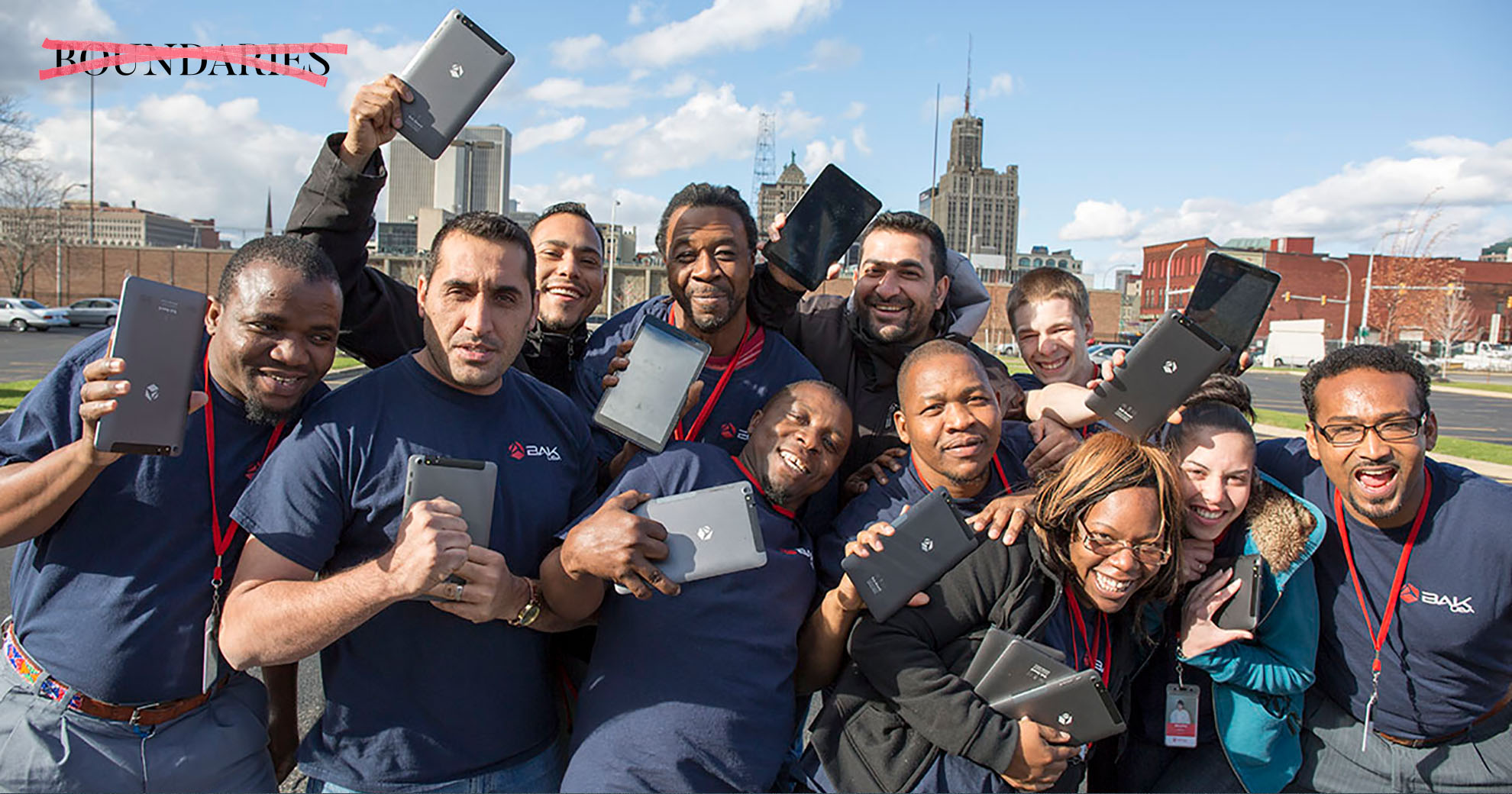This is the digital version of Death at Pan Am, the futuristic article in No Boundaries magazine, released fall 2021, depicting Buffalo in 2051. Our authors were given a 12 page report compiled by area professors, researchers and non profit leaders about the city we might have by then, if we get to work now. Those authors then let their imaginations run wild.
The entire production was presented by West Side Promise Neighborhood.
This article is presented by Agency FIFTEEN
(All references to actual persons or actual stories are purely coincidental)
Please support Rise. Order a physical copy to be delivered to you today!
Green Halogen
Written by Francesca Bond
Illustrated by Renee Helda
SEPTEMBER 2051
Inventor Luca Griswold was feeling nervous. On a late morning in early September 2051, he paced inside of his green-and-white striped circus tent at the return of the Pan-American Exposition on the Lake Erie shoreline, surrounded by his life’s work, which were several pieces of technology each no larger than a crab apple.
It was his first time in twelve years being back home in Buffalo and he had been anxiously anticipating, maybe dreading, his presentation for months. It was basically the high school reunion he never planned on attending. But as he was preparing to reveal his latest technological achievement later in the day, his mind was elsewhere, for there was a more important reason he was back in Buffalo. Shifting his eyes all around the dim backstage, he wondered: Where was Florence Cameron?
Three miles away, Silas Washington was stepping out of her rainforest shower. She took a late shower that morning, since her wife Charlene was taking their daughter to the Pan-Am. While Charlene often had time to herself designing clothing for her brand, Silas was normally taking care of their daughter, Liberty. So while she was at home alone, she caught up on local magazines and gave her cropped black hair a trim. Then it was time for yoga in their rooftop garden, where she could enjoy the late summer sunshine under a cool canopy of palm leaves the size of parasols. She was having a great day. It would last another twenty minutes or so, at which point she decided to check in once more on her detective brother-in-law Florence, who had been worrying her recently. But what else was new?
Meanwhile, Charlene Cameron was thinking about her mom, Rachel. As she appraised the vendors and patrons around her at the Pan-Am, Charlene felt as though she was looking through her mother’s eyes; “Ooo, I love that,” her mother would have cooed while making her way over to the slow fashion booths. “Exactly!” Rachel would have cried when she noticed that the silent rides were powered by solar. Twenty-four different streetcar and metro lines were bringing people from all around the city,suburbs,country, and world together in Buffalo’s Outer Harbor. It was her mother’s dream. And she knew her mother would have cried seeing Liberty, her granddaughter, clutching to Charlene in the same way Charlene used to cling onto her. Partners-in-good, that’s what her dad always used to say. Then Charlene started thinking about him too.
“I want to see the butterflies,” five year old Liberty reminded her mother for the third time. “When is Uncle Flo going to get here?”
“I know. He’s pretty late,” said Charlene. She checked her younger brother’s location on her watch, but it was still on incognito mode, where it had been since yesterday evening. She started to feel a bit queasy, because Florence rarely went off the radar like that, although it had been happening more lately. The two usually had nothing to hide from each other. She recorded a brief message to send to him, the third she had sent since last night. This was the same brother who used to collapse into tears when Charlene picked him up late from high school and who never failed to remind her of the rail schedule even though they have both had it memorized for two decades. It’s no secret where Liberty gets it from, Charlene thought, before guiding her young daughter to see some butterflies.
***
When Charlene spotted Silas in the conservatory, the pit in her stomach became unbearable. Silas wasn’t supposed to be at the exposition today. It was her self-care day. But she must have been feeling the same instinct about Florence.
“Charlie, have you seen Flo? He’s not answering my notes. I don’t feel good about this. You know he’s been acting weird lately and I can’t help feeling like he’s been up to something,” breathed Silas into Charlene’s ear so Liberty couldn’t hear; Liberty’s eyes started to swell anyway. They couldn’t hide anything from that girl.
“Where’s Uncle Flo?” Liberty demanded.
Sweeping Liberty into her arms, Silas grabbed Charlene and together the family bolted out of the conservatory and into a chaotic crowd. They had never seen the Outer Harbor so packed. It was a celebration of how far the city had come, and how far society had come, really, since its darker days of unchecked capitalism, ruinous conservatism and environmental devastation. It was a celebration Charlene wanted her parents to see. They worked so hard for this.
“Snap out of it, Charlie,” she repeated to herself. Her little brother was nowhere to be found and all she could think about was her parents. She looked at Liberty and wanted to shrink down to her size. Silas could handle it. Charlene didn’t know if she could.
They ran up to the satellite police booth and saw Jayden Price, the neighborhood police officer in charge of the Outer Harbor. Silas told Price they couldn’t find Florence and that he never hid his location from them, so this was all really weird. They urged him for his help.
They stood in the police station staring out at Lake Erie and the festivities, their laughing neighbors and smiling tourists, while Price reached out to Florence’s colleagues at the Buffalo Police Department. Florence and Price had been friends ever since training to join the department together and Jayden knew well about Florence’s tendency to take his detective work so seriously that he could find himself in trouble.
“It’ll be okay,” Silas told her family, but her face betrayed her real thoughts.
Silas was beginning to see that she and Charlie had been too wrapped up in their own worlds to pay much attention to Florence lately, while Flo slipped in and out at odd hours and stopped giving them a nightly run-down on all of the drama he saw in the city’s detective bureau. He had been retreating—Silas didn’t know why—and knowing why seemed very important right about now.
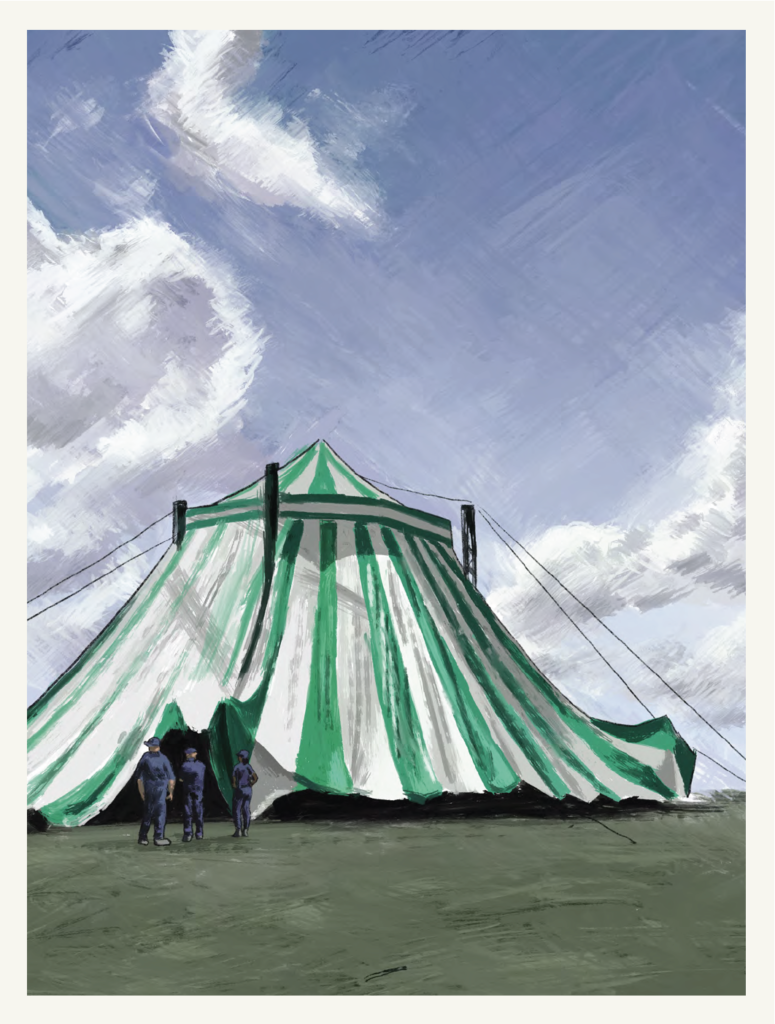
Back at his tent, Luca was going over the day’s schedule.
“Florence Cameron should have shown up around 10 a.m., but he’ll be here soon. My first performance is at 1 p.m. I have to knock that out of the park. That’ll show them all that I’m not a nobody… still, I’m cutting it pretty close,” Luca murmured to himself as he tinkered with his appearance in a mirror. He looked as unassuming as ever, like someone no one would usually notice, for better and worse.
God, he hadn’t seen Florence in the flesh in ages, he thought.
They had been the best of friends, until they suddenly weren’t. Popular Florence had been the only real friend of much-less popular Luca when they were children. But after the fire, nobody, not even Florence, wanted to be anywhere near Luca. Luca had been forced, really, to find connection somewhere else. Or at least, that’s how he looked at it. If no one decent wanted to be around him, well, there would always be indecent people, no matter how far society progresses.
He had fallen in with the wrong sort years ago, after his parents hijacked the lives of him and his siblings by moving the family to a rural village halfway across the world one winter. His parents couldn’t stay in Buffalo much longer after the Cameron fire, not with all of the whispers, stares, and investigations.
Luca found a group of what he had no choice but to call friends in the village. They were the children of other rich people in hiding. Luca learned his parents were a part of some secret political organization with other one-percenters, but his parents never told him anything about it. When he went off to college, he barely visited his parents. They had never been warm and fuzzy, but moving from Buffalo changed them; they were angrier, hollow—hushed meetings and revenge consumed their lives. They didn’t spend any time enjoying the money they clung to.
His brother was the one who told him when his parents finally disappeared completely. None of his siblings apparently knew where they went, but they all seemed to believe they were still alive. It was then that Luca began wondering what, exactly, his parents had been a part of—and what, exactly, killed the Camerons?
Flashbacks of happier times between him and Florence started to pop into his memory, but he quickly shut them out. That was a long time ago, he thought, a whole lifetime ago. Then his face hardened as a new train of thought entered his mind: Florence turned on him when he needed him most, just like everyone else.
When Luca heard through the grapevine that Florence was working on an investigation into the Gottman family for felony money hoarding, he thought it might be time to return to Buffalo, after all. He had been hearing rumors—a remark from a sister here, an off-putting social post from an old friend there—that the organization his parents were a part of was growing more powerful. He couldn’t be sure, but he thinks he even heard the name Cameron mentioned once. Despite, or maybe because of, their messy history, he felt Florence at least deserved a warning. Plus, it was Florence who reached out first.
Luca heard hesitant footsteps approaching and grinned as he messed with his tie one more time.
“Florence, nice to see you,” Luca said and started to spin around. But the pistol suddenly aimed between Luca’s eyes obscured Florence’s face. He closed one eye to peer at Florence and saw him holding a finger to his lips.
***
It felt to Charlene like they had been waiting inside of the police barracks for hours, but her watch told her it had been only forty-five minutes. She needed to get some air.
She was about to step out of the station when Officer Price received a message.
“Florence,” said Price.
In a matter of seconds, Price wordlessly shepherded Charlene, Silas, Liberty and a couple of officers out of the station. Charlene found herself rushing after Price, snaking through crowds, oblivious to the music and fanfare around her.
The sprint ended at inventor Luca Griswold’s circus tent. Price and the other officers entered first, attempting to keep Charlene and her family outside, but there wasn’t much that could stand between her and her brother. Charlene followed Price into the tent while Silas stayed outside with Liberty.
She entered the auditorium and found Florence, unmistakable with his curly red hair, sprawled across a couple of wooden fold-up chairs with blood all over his chest. She knew instantly that he was gone.
Part of Charlene already died thirteen years ago when her parents perished in their family home during an arson fire. Charlene, then seventeen years old, and Florence, who was fourteen, had been out swimming at the time. Every day after school, Charlie and Flo met up with a bunch of neighborhood kids to swim in the Scajaquada Creek. That tradition saved their lives.
Their parents, Rachel and Josiah Cameron, were affectionately called Buffalo’s “dream team.” They were a pair of detectives who were privately passionate about the city’s just transition towards social equity and environmental stability. After the city passed a controversial wealth cap, the Camerons took on many of the cases investigating wealth distribution. They were in the middle of exposing several prominent Buffalo families for hoarding wealth past the mandated incremental distribution periods when a newspaper article headlined “Camerons Hope to Build Utopian Future” ran, hinting at their imminent triumphs. The following day, beloved Rachel and Josiah were burned and choked to death inside of their Ellicott Street home. Police caught the low people on the totem pole that carried out the arson, but never convicted the persons who sent the orders, though there were rumors. Charlene had also found a small unidentifiable gold coin in the rubble stamped with a drawing of a cornucopia, which she held onto, believing it to be some sort of important clue.
Charlene always suspected their murders had something to do with the wealth cap investigations.
After the fire, Charlene dedicated herself to raising Florence and carrying on her parents’ legacy. She used their inheritance to rebuild their family home on the same site as their old one, but she bought more land and built a shelter, too. Charlene and Florence, and then eventually Silas, and then eventually Liberty, lived on the top floor, while Charlene ran a temporary housing shelter to help people get back on their feet and a small fashion brand repurposing used textiles. Her therapist believed she would rather keep herself busy than spend any time alone with her brain and her grief. Charlene’s eyes glazed over whenever her therapist told her this.
Florence, however, threw himself into investigating his parents’ murders. While other teenagers and twenty-somethings partied,played soccer ,swam, skied, and dated Florence worked his way up into becoming one of the city’s youngest lead detectives at age twenty-three. He was well respected by his peers and known for his dogged determination to find the truth. He distracted himself with retro television shows, mostly House Hunters, in his free time.
Both siblings worried each other.
Charlene had been especially worried about Florence over the past year or so. He was more withdrawn. He spent less time with Liberty. He holed up in his office and kept the door locked when he wasn’t around. It had been even worse lately. Why didn’t she say anything? She started to cry.
***
Just a few feet away from Florence’s dead body lay a bloody but alive Luca Griswold receiving medical attention from one of the officers.
“There was a gun in between them,” Price told Charlene quietly.
Charlene remembered Florence hadn’t spoken to Luca since the fire, mostly because he suspected Luca’s parents of being behind the arson. Florence retreated from most of his friends then, but especially his friend who reminded him so painfully of the death of his parents.
The Griswold parents had disappeared by the time investigators knocked on their door after discovering they were two of the people the Camerons had been investigating for bucking the wealth cap. Nobody had seen them in the twelve years since, but there were rumors they joined an extremist group carrying out revenge attacks on behalf of the one-percenters who lost their treasure troves of assets when municipalities and states across the country opted to institute wealth caps and higher taxes on the rich.
There had also been rumors that some of the Griswold children joined their parents in the extremist group, though the Griswold children that returned to Buffalo swore they hadn’t heard from their parents in years. She wondered if a Griswold had taken another person from her as she felt an urge to rip the officer off of Luca and have her revenge.
“Charlene, I didn’t kill Florence,” said Luca, grimacing through the pain from the bullet wound in his arm. “He asked me for help. I was helping him. Someone was after us.”
“What was it he asked you to do?” asked Charlene in a cold, defeated voice.
“Well…” Luca hesitated and looked at the police officers. He straightened himself up. “He wanted some tech help. He had this idea in his head that the scooter guy, Robert Gottman, was hoarding money—millions of it. He said the guy was fudging numbers left and right for all kinds of things on all of his municipal contracts for personal scooters . . . and in his taxes, so the government would never find out how much money he really had.
“Gottman wasn’t vocal about his views on the wealth cap because he wanted all of those scooter contracts, but you better believe he opposed it,” Luca added. “He had always been close to my parents.”
Officer Price was combing Luca for more information when he heard the noise. He spun around — they all did — and saw a figure in dark clothing and a bucket hat racing out of the tent.
“That’s them!” shouted Luca.
The suspect dashed out of the tent and into the crowd, but not before Price got a good look at them in the sunlight. He darted after them and held onto the mental snapshot of a long navy jacket, dark bucket hat and tucked hair. What color was it again? He didn’t have a face to go on and anyone can ditch clothes. No, he would have to run faster.
The Pan-Am visitors were entirely and blissfully unaware of anything sinister going on that afternoon. Politely dividing to let Price run through the crowd, many guests didn’t give the sight of a police officer sprinting through a festival much thought. Crime had been decreasing for years thanks to equalizing social programs and the redistribution of wealth. Police played many roles in a community. For all they knew, the officer was playing a game of tag. The Pan-Am and its rides, games, performances, and exhibitions roared on.
Price spotted the figure again running down a dirt path into the woods when he decided to gamble. He split off behind a kale chip vendor to a shortcut he knew met up with the path. Sprinting so fast he couldn’t breathe and eating early September bugs in the air, Price met up with the path and collided with a person. It was the figure.
Staring straight at Price, the figure popped a small pill and collapsed to the ground. Price pinned him down and realized he was now staring into a lifeless face.
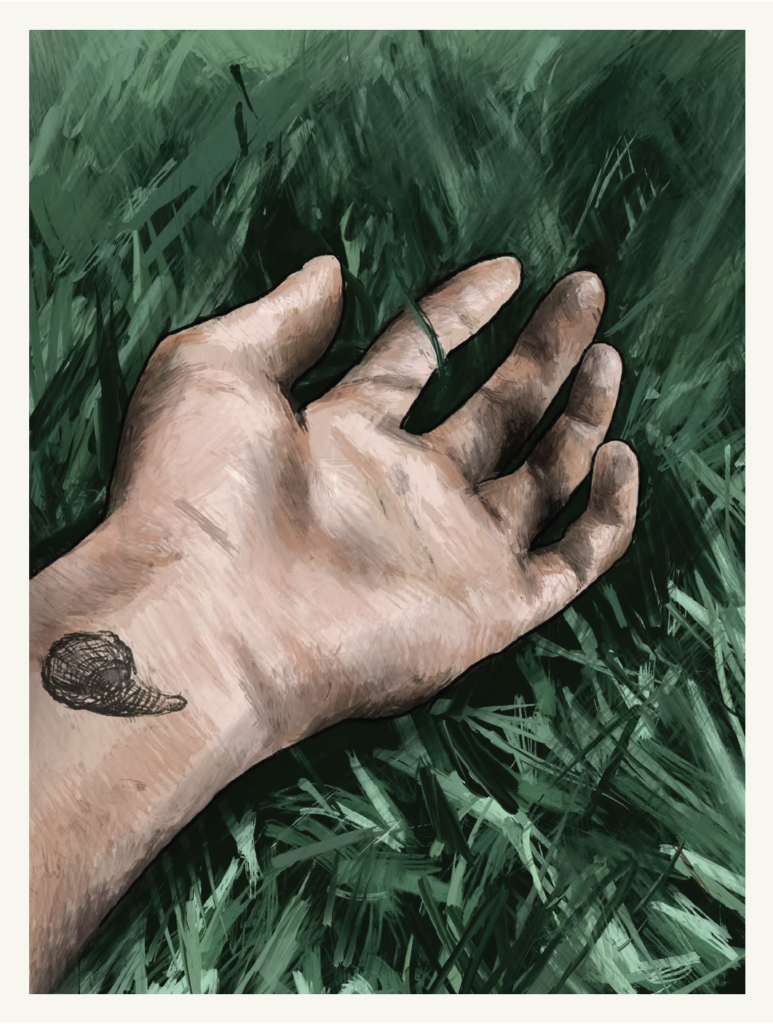
Before his death, Florence had been working on a big case about people who had been disobeying the city’s wealth cap. He had documented every part of his private investigation into the Gottmans. The city was working on seizing many of the Gottmans’ assets—items everyone wondered how they could afford and several houses in remote places. Other prominent families were implicated in Florence’s findings, too, though it was clear his investigation was far from over.
Police were never able to identify Florence’s killer. The conclusion was that he was a young assassin who had been working for the extremist group that counted the Griswold parents and Gottmans as its members. He had a tiny tattoo on his wrist of the same symbol that had been found on a coin at the Cameron house after the fire—a cornucopia. In ancient mythology the cornucopia symbolized abundance, nourishment, and prosperity Charlene learned. She gave a sardonic laugh when she discovered that it was the extremist group’s symbol of choice. “Abundance for one and nothing for all,” she thought.
Florence had been onto the group, too, before his death. That was where Luca came in. Florence’s papers and journals on the group were senseless to everyone else, but Luca was able to shed light on them with inside information he hadn’t realized he even had collected over the years. The investigation gave Luca a new purpose. The torch of the Cameron legacy was passed on to him. He started to look over his shoulder more often.
About six months later, Charlene was looking through Florence’s bookshelf while holding his favorite Build-A-Bear from when he was a child.
She started seeing a therapist again, who told her that she should try to remember her brother instead of blocking him out because of the pain. She was trying, but boy, was there pain.
Charlene pulled out a battered copy of Dr. Seuss’s The Lorax, one of the few books to survive their parent’s fire. She became emotional while remembering how much that book meant to her brother, who carried it around in his backpack for the rest of high school, and who used to leave secret notes for Charlene in it so that his babysitter wouldn’t read them.
A note fell to the ground, just like the old days, as she opened it up.
The note read: “Charlie, I’m not sure what will happen to me, but I have to pursue a new lead on mom and dad’s deaths and no one can know. I think Luca Griswold will be able to lead me to them, for better or worse. This group is more omnipresent than we thought. The war is far from over. Be careful who you trust. Love you, my partner-in-good.”

